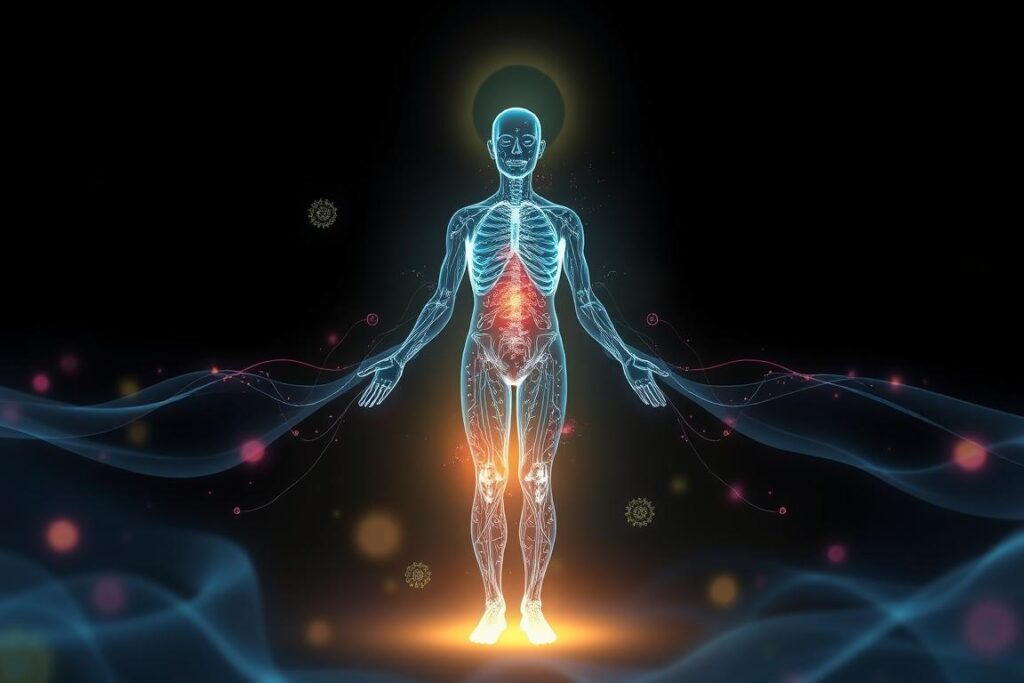When we talk about metabolism, age and health, a question arises. The metabolism Does it really decrease after age 60? Recent studies show that it remains stable between ages 20 and 60. After that, it begins to decline, affecting our health and well-being.
Studies analyzed calorie burning in 6,000 people of various ages and countries. They found that metabolism only begins to decline significantly after age 60. This contradicts the idea that it slows down in middle age.age. This makes us think about how metabolism changes over time and how to maintain health metabolic.
Understand how metabolism changes with age age is crucial to our health. As we age, our metabolism can change, affecting our body composition and overall health. In this article, we’ll explore these changes and how to maintain metabolic health throughout life. We’ll talk about metabolism, age, and health.
What is Metabolism and How Does It Work?
Metabolism is the process by which the body converts food into energy. It involves transforming the nutrients ingested into energy. This maintains bodily functions.
At the rate of basal metabolism is influenced by factors such as age, sex and body composition. It is the rate at which calories are burned when the body is at rest.
Basal Metabolism: Fundamental Concepts
THE basal metabolism It is responsible for about 65% of the body's total energy expenditure. It is essential for maintaining basic bodily functions. These include breathing, blood circulation, and regulating body temperature.
Factors that Influence Metabolism
In addition to age, sex and body composition, other factors influence metabolism. Genetics, level of physical activity and diet are examples. For example, a high-protein diet can increase energy expenditure. A high-fat diet can decrease metabolism.
How the Body Processes Energy
The body processes energy from food. This involves breaking down nutrients into smaller molecules. These molecules are then used to produce energy. energy processing is influenced by the rate of basal metabolism and processing efficiency.

| Factor | Influence on Metabolism |
|---|---|
| Age | Decrease in metabolism with age |
| Sex | Differences in metabolism between men and women |
| Body composition | Influence of muscle mass and body fat on metabolism |
Natural Changes in the Body as We Age
THE aging brings changes to the body, such as loss of muscle mass and fat gain. These changes can affect the health and metabolism.
Some common changes include:
- Loss of muscle mass: about 1% to 2% per year after age 60
- Increased adipose tissue
- Decreased bone density, increasing the risk of fractures
- Reduced cognitive ability and increased risk of chronic diseases
Understanding these changes helps to adopt strategies healthy. This promotes a aging healthy and minimizes negative effects.

Staying active and eating a balanced diet helps. This can mitigate some changes and improve your health. health during the aging.
| Body Changes | Health Effects |
|---|---|
| Loss of muscle mass | Increased risk of fractures and chronic diseases |
| Increased adipose tissue | Increased risk of cardiovascular disease and diabetes |
| Decreased bone density | Increased risk of fractures and osteoporosis |
Does metabolism really only slow down after age 60?
Many people think that the metabolism decreases a lot after the age of 60. But, you need to look at the scientific evidence to learn more. Research indicates that metabolism remains stable until the age of 60. After that, it begins to gradually decrease.
Some of the main scientific evidence include:
- The decrease in lean mass in adults after 50 years of age, with a reduction of 1% per year.
- Increased body fat in older adults, associated with decreased physical activity and secretion of hormones.
- The importance of a high protein diet to accelerate metabolism, as protein has a greater thermal effect compared to fats and carbohydrates.
Additionally, factors such as lack of sleep, physical inactivity, and low vitamin D can affect the metabolism. On the other hand, a balanced diet, exercise and a lifestyle healthy can help maintain the metabolism up to date, even with the age.
In short, although the metabolism may decrease over the years, there are many factors that influence this. Based on the scientific evidence, we can take steps to maintain the metabolism healthy, even with the age.
Body Composition in Old Age
Body composition is essential for health, mainly in third age. Over time, many people lose muscle mass and gain body fat. This may harm the health and metabolism.
With the elderly population growing, understanding the body composition in this range is crucial. Bioelectrical impedance is a technique used to measure this, with accuracy of 85% to 95%.
Some important facts about the body composition in the third age include:
- Age-related loss of muscle mass, known as sarcopenia, which affects up to 30% of elderly over 80 years old.
- Increase in the percentage of body fat up to 2% per year after the age of 60.
- Decrease in free mass fat in the same proportion.
It is important to take into account factors such as gender and age when evaluating the body composition. The percentiles for arm circumference and others show differences between age groups. Assess the body composition must be done together with the health general, including chronic diseases and quality of life.
Impact of Diet on Metabolism in the Elderly
THE food is very important for metabolism, especially in third age. As the years go by, the basal metabolism decreases. Thus, elderly need fewer calories. But it is crucial to maintain a balanced, nutrient-rich diet for health.
Some important points to consider are:
- Adequate intake of fruits and vegetables, which is essential for long-term health.
- The importance of adequate hydration, as dehydration can affect the health of elderly.
- The need for a food balanced, which includes a variety of foods rich in essential nutrients.
One food Inadequate nutrition can lead to health problems. This includes malnutrition or being overweight. Additionally, loss of muscle mass can decrease mobility and affect overall health.
To maintain a healthy metabolism, seniors need a balanced diet. This means eating fruits, vegetables, lean proteins, and whole grains. It’s also important to drink plenty of water and avoid processed foods and foods high in sugar.
| Food | Benefit |
|---|---|
| Fruits | Rich in vitamins and minerals |
| Vegetables | Rich in fiber and antioxidants |
| Lean proteins | Help maintain muscle mass |
| Whole grains | Rich in fiber and essential nutrients |
The Importance of Physical Activity in Metabolic Maintenance
Having an exercise routine is crucial to maintaining a healthy metabolism, especially in third age. The physical activity is essential for burning calories and maintaining muscle mass. It also improves heart health.
Additionally, regular exercise can prevent serious diseases, including diabetes and heart problems.
Studies show that the physical activity keeps the metabolism active in third age. This is because exercise helps maintain muscle mass. Muscle mass is essential for metabolism.
Additionally, regular exercise improves health general. They reduce the risk of chronic diseases.
A table illustrating the importance of physical activity in metabolic maintenance is as follows:
| Type of Physical Activity | Benefits for Metabolism |
|---|---|
| Aerobic exercises | Helps burn calories and maintain muscle mass |
| Strength exercises | Helps maintain muscle mass and improve cardiovascular health |
| Regular physical activity | Helps prevent chronic diseases and improve overall health |
Hormones and Their Influence on Metabolism
You hormones play a crucial role in our metabolism. They can change our metabolic rate. health depends a lot on the hormones, which control many functions of the body, including the metabolism.
Some foods, such as avocado, green tea, and plain yogurt, help you lose weight. They improve your health general. To learn more about these foods, visit the website foods to slim your waist.
The main hormones that influence the metabolism include:
- Thyroxine
- Cortisol
As we age, hormones can change, affecting our health and the metabolism. Understand how the hormones affect the metabolism is essential to maintain a health healthy.
Strategies to Keep Your Metabolism Active
Keeping your metabolism active is essential for your health, especially in old age. Several strategies can help, such as exercise and daily habits.
Adopt strategies appropriate for your age and health is important. Exercises such as walking, swimming and weight training are good. They can be adjusted to suit different needs.
Recommended Exercises
Exercises such as:
- Walking: easy and accessible everywhere
- Swimming: Good for your joints and low impact
- Bodybuilding: helps build muscle mass and increases metabolism
Beneficial Daily Habits
Daily habits are also important. For example:
- Getting enough sleep: essential for health and metabolism
- Managing stress: Chronic stress can harm your metabolism
- Maintain a balanced diet: helps keep your metabolism active
These strategies can improve overall health, especially as you age. Remember to consult a professional before starting any new exercises or habits.
| Strategy | Benefit |
|---|---|
| Regular exercise | Helps keep metabolism active and promotes overall health |
| Beneficial daily habits | Helps regulate metabolism and promotes overall health |
| Balanced diet | Helps keep metabolism active and promotes overall health |
Warning Signs of Metabolic Problems
It is crucial to keep an eye on warning signs that can point to metabolic problems. This is especially true for those over 60. In Brazil, the population in this age group is growing a lot. This could mean more cases of metabolic problems.
The main ones warning signs they are:
- Weight gain
- Fatigue
- Changes in appetite
Those warning signs may be linked to metabolic problems. For example, loss of lean mass and increase in adipose tissue. Adipose tissue is less metabolically active.
To take care of health and avoid metabolic problems, it is essential to pay attention to these warning signs. It is important to adopt a lifestyle healthy. This includes eating well and exercising regularly.
| Warning Sign | Description |
|---|---|
| Weight gain | Weight gain due to excess calories |
| Fatigue | Excessive tiredness or fatigue, especially after physical activity |
| Changes in appetite | Changes in appetite, such as increased or decreased appetite |
How to Adapt Your Lifestyle After 60
After the age of 60, it is essential to change your lifestyle to take care of health. This involves making changes to your daily routine. For example, it is important to exercise regularly and eat well.
Changes in Routine
- Incorporate at least 30 minutes of moderate physical activity most days of the week
- Maintain a balanced diet, rich in fruits, vegetables and proteins
- Drink at least 2 liters of water a day
Professional Monitoring
Search professional monitoring is also crucial. This helps to monitor the health and make adjustments when necessary. Medical consultations and evaluations of health are part of it.
| Activity | Frequency | Benefits |
|---|---|---|
| Walk | Daily | Improves cardiovascular health |
| Stretching | 3 times a week | Improves flexibility |
Conclusion
THE metabolism is essential for health, especially in old age. We discuss the importance of metabolism and how it changes with age. aging. We also talk about how to maintain a healthy metabolism.
Although metabolism slows down over the years, it is possible to make changes. A balanced diet, regular exercise, and medical check-ups can help a lot. This promotes a lifestyle active and healthy in old age.
Studies show that metabolism slows down with age, about 0.7% per year after age 60. However, there are ways to reduce this loss. Maintaining healthy habits and seeking specific interventions are essential.
Therefore, it is crucial to be aware of the warning signs. Making the necessary adjustments helps keep your metabolism active. This keeps your health in balance during the aging.


